Dismantling the Fortress: Corey J. Mahler and the Lutefash.
Content Warning: Intense anti-semitism, white supremacy, and discussions of Nazism, violence, and anti-LGBQTIA+ views. The post is intended as a resource to identify the specific harms of Corey J. Mahler, the context he is in and the religious organization around him. Machaira Action explicitly denounces white supremacy and fascism in all forms and makes every attempt to cite specific instances WHILE not amplifying hate. Some links are specifically not provided to avoid providing oxygen to these abusive ideologies.
Welcome to Dismantling The Fortress: Corey Mahler and the Lutefash, a series devoted to monitoring the rise of a white supremacist faction within the Lutheran faith. We will be examining the dangerous spread of this ideology and exposing the individuals within it who pose a threat to the community.
“Lutefash” is not a word they use to describe themselves, rather it is our way of giving a name to this network of Lutheran fascists that doesn’t have any self-identifying terms (other than casual references like “based LCMS”).
This first article in our series will explore the supremacist ideology of the Lutefash movement and its broader role within the fascist “faith” community. We will also identify one of its principal thought leaders, Corey J. Mahler.
Mahler stands out as a figurehead among far-right American Lutherans. We’ll learn about his role in neo-Nazi fundraising, his carefully crafted online platform, his church home in Knoxville, TN and his growing network of alliances in the Lutefash world. As we work our way through the characters in his orbit you’ll meet everyone from infamous names like Jason Kessler and Vanguard America’s Blake Kilbourne, to the young and impressionable former horror novelist Zak McGaha, who hangs on Mahler’s every word. You’ll meet the notorious “crying nazi” Christopher Cantwell and Lutheran shock jock Ryan Turnipseed, as well as a variety of other characters who have either partnered with Mahler or have enabled his rise to prominence in Lutheran circles.
Mahler began to grow his brand among the Lutefash when he stepped into the disarray that followed the Unite The Right rally. He’s been trying to build a theological fortress for Lutheran fascists ever since.
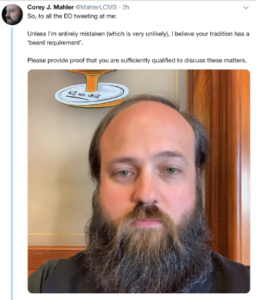
In 2017, a horde of neo-nazis and white supremacists marched from the Internet’s dark corners and, armed with torches, took to the streets of Charlottesville. We all remember what followed: the brazen and bloody violence, the murder of Heather Heyer, the shock. Despite all the warnings that had been coming from antifascists, Black folks and communities of color, for many people Unite the Right lifted a veil off the face of white supremacist terror in America, and the depth of its support, including the tacit sympathy of a sitting President.
After the event, many of the organizers scurried back into the dark. As they tried to cover their tracks, antifascist research groups gathered receipts and began a long campaign of accountability that continues to this day. Court cases, ID drops, and the continued research of groups like Ignite The Right have since identified many of the Unite The Right (UTR) participants. Some of the UTR supremacists, like Jason Kessler and Andrew Anglin, are well known and have suffered public consequences. Other key members and second-tier enablers have been forced to lay low.
As the far-right regrouped following UTR, representatives of the mid-2010’s ‘alt right’ began to commingle more regularly with the Christian nationalist movement, which had been emboldened by the rise of Trump and his cadre of Christian sycophants. Where the former privileged dreams of a white ethnostate encompassing paganism and even atheism, the ascendant Maga-dominionists lay emphasis on theocracy. The convergence of these far-right movements isn’t exactly new, but, particularly now with Elon Musk’s twitter, its capacity for harm is much greater than it has been in recent memory.
The most visible demagogues on Twitter and elsewhere don’t work alone, though. Nazis who stand in the spotlight rely on a secondary level of enablers. But behind every Kessler stands an army of sycophants and supporters who amplify, applaud, and encourage white supremacist bullshit. Here, we focus on one of these second-tier enablers.
Today, many confessional Lutherans funnel into neo-nazi ideology through the insidious efforts of one Christofascist in particular: Corey J. Mahler. His ascent illustrates how fascism is built on enablers all the way down. In his case, his set of enablers come from within conservative Lutheranism—some willfully, and others through ignorance. But in trying to share a space with a fascist, they’re allowing Mahler’s crew to take it over.
The Lutheran Church (Missouri Synod) And Christofascism in the United States
The Lutheran Church Missouri Synod (LCMS) is the second-largest Lutheran denomination in the United States, boasting an estimated 1.8 million members as of 2021. Founded in 1847 as the “German Evangelical Lutheran Synod of Missouri, Ohio, and Other States,” the LCMS now has congregations in all 50 states, Canada and a growing presence globally. Despite Lutheranism’s perceived association with mainline progressivism (mostly through the work of the ELCA and more liberal voices like Nadia Bolz-Weber), the LCMS holds a staunch conservative theology; forbidding women in leadership, maintaining virulent opposition to LGBTQIA+ folks, and adhering to a loud anti-choice stance on abortion.
Within its already conservative ranks a far-right faction is growing, agitating for more stridently reactionary positions. The significance of this faction is evident from Unicorn Riot’s Discord leaks, which exposed the private chats of thousands of white supremacists between 2018 and 2020. A noticeable number of chat participants self-identified as being part of the LCMS, including a member of the “Traditionalist Worker Party,” a neo-Nazi organization that was present at Unite the Right in 2017. Elsewhere, chat members admired the LCMS’s far-right reputation, alongside their explicit racism, homophobia, misogyny, antisemitism, ableism, and calls to replace America with an openly fascist state. For example, one member in a Nick Fuentes group referred to another as “based LCMS bro.” 
Today, this faction of the LCMS strongly identifies with the label “Christian nationalist.” Some even proudly identify as fascists, espousing deeply anti-semitic and neo-nazi beliefs. Most recently, this faction has come into conflict with LCMS president Matthew Harrison and his supporters over its new edition of Luther’s Large Catechism, a foundational document to Lutheran denominations. In the opinion of this faction, the essays published in the new edition implicitly support Marxism, critical race theory, trangender identity, homosexuality, and even pedophilia. A cursory overview of the offending passages reveals nothing more than politely phrased opposition to all the above. Nonetheless, the Lutefash successfully pushed to pause distribution of the volume, although distribution has resumed as of February 2.
Using podcasts, blogs, Twitter accounts, and right-wing social media forums, these LCMS-fascists rally around an ideology that joins Evangelical conservatism’s anti-trans and anti-CRT sentiments with open white ethnocentrism. Perhaps because of Martin Luther’s own vehement antisemitism, Lutefash in these forums cast their faith among the thorns, where admiration for Hitler, denunciation of the Jews, and opposition to interracial marriage choke and twist the conversation.
While Lutefash often express their white supremacist sentiments explicitly, they also sometimes do so in code. For example, in a Telegram Channel run by Corey Mahler, one user stated, “1483 men. Jesus Christ is wonderful.”

NOTE: 1483 is a ChristoFascist spin on the nazi code of 1488: 14 stands for the 14 words of David Lane about protecting whiteness, while 88 duplicates of the eighth letter of the alphabet, HH, for “H*il H*tler.” In this instance, 1483 represents the 14 words plus “Heil Christ”—a call for white Christian nazism.
Mahler’s Telegram channel attracts similar minded zealots. One user praises him by writing, “There really need to be more Protestant fascists. Your takes on these issues are a breath of fresh air.”

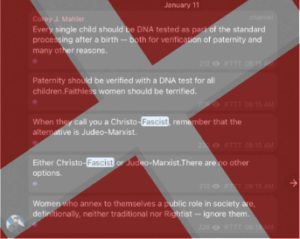
Lutefash Telegram channels and blogs are replete with this dark and antisemitic trash theology. What’s more, they show how large Corey Mahler’s presence looms in these networks. Whether through his Twitter account, his podcasts—Stone Choir, Tischreden, and Confident Faith—or his several websites, Corey has become a particularly successful apostle of Christian fascist ideology. To quote one of the Telegram posts in the above screenshot, his message is: “Either Christo-Fascist or Judeo-Marxist. There are no other options.” For him, fascism is a useful means to an end, a “bridge back to proper governance.” Or, as he put it in blunter terms, “I am a Fascist, because it leads to Monarchy.”


Obviously, we can append “theocratic” to his use of “monarchy.” Now, let’s look at how Corey is building his part of the “bridge” back to theocracy.
Corey Mahler’s background
Mahler’s current Twitter account is the second in his career as a public fascist. Equally as toxic as his first account, Mahler’s present profile states that he lived in California most of his life, “more than thirty years.” Based on address records and his former law offices, we can confirm that Mahler spent his formative years in Ranchos Palos Verdes, CA. There, he wrote in a May 2022 “letter to President Harrison of the LCMS,” he attended an LCMS school (likely Christ Lutheran Church and School). While from the LCMS background, Mahler states that he did not become baptized into the LCMS until later in life.
It is unclear when Mahler became an official Lutheran. However, his comments in a January 25, 2023 episode of his podcast Stone Choir suggest that he converted during his college years at the University of Michigan (he graduated in 2008, with a B.A. in Political Science). After graduation, Mahler completed a law degree at Chapman University’s Fowler School of Law, an institution not far from his home in California. Around the time Mahler attended Chapman, its law faculty included John Eastman, the attorney who represented Donald Trump in his attempt to overturn the 2020 election. (Eastman’s involvement led to his forced resignation from Chapman in early 2021.) Chapman’s long reputation as a conservative-leaning university may account for Mahler’s choice to attend its law school. At some point in this period, Mahler further immersed himself in the Christian right by attending Pepperdine University, a Christian college that has also garnered a conservative reputation. At around 02:23:06 of Episode 3 of Tischreden, he mentions driving to Los Angeles from San Diego when he was “going to Pepperdine.”
After earning his law degree in 2012, Mahler pursued several business ventures, including starting up an IT services company called Zyniker Computer Services. (“Zyniker,” German for “cynic,” is the same name as Mahler’s law firm, which would gain notoriety for representing Charlottesville “luminaries,” as discussed below. “Zyniker13” also served as Corey’s Github alias around this time). In 2018, Mahler renamed the company Bristlecone IT, probably because the bad press associated with his law firm had begun to give it a bad name. But despite this attempt to salvage its reputation, Zyniker/Bristlecone remains a cornerstone of his descent into fascist organizing.
Mahler’s Radicalization and Collaboration with Jason Kessler
Initially, Mahler’s blog posts combined his IT knowhow (“Encryption Explained”) with a fairly standard range of conservative beliefs, such as climate change denialism and denunciations of the Left’s “governmental power.” However, Mahler’s interests appeared to change when he briefly moved to Berlin to earn an LL.M (a Master’s in Business and Law) in 2016-2017, returning just before Unite The Right in Charlottesville. A few months later, in October 2017, Mahler began to focus on ethnonationalism. By the following spring he was expressing an open and unabashed European (read as white) supremacism, as seen in a May 17, 2018 blog post entitled, “The European Peoples and Christianity.” Here, in embryonic form, we can see the pro-white theology that Mahler now propagates incessantly. Europeans, as “God’s chosen people,” are uniquely equipped to maintain Christianity, while “heathens” have and continue to threaten the faith’s foundations. In a move that most traditional Christians would find shocking, Mahler even calls the Bible a “lesser revelation” compared to that of “Nature,” so that he can praise pre-Christian Europeans for venerating this revelation through pagan mythology. In this post, Mahler also forges a link between Lutheranism and the veneration of “Volk,” or the “folk” that lies at the core of neo-nazi ideology. This myth of a pure “folk” culture lurks under his boast that Europeans (read as German Lutherans particularly) “built a Church that respected tradition, defended our Volk, and gave glory to God.”
Around this time, Corey Mahler started to put his “volkish” obsessions into action by becoming an attorney for one of the UTR Charlottesville organizers, white supremacist Jason Kessler. While Kessler listed “Kolenich Law Office” as his attorney in a January 12, 2018 post to his website, by February 2018, he began listing “Zyniker Law” as a proxy for donations. Due to public pressure on Big Tech, UTR defendants needed ways to get around increasingly difficult obstacles to fundraising. Corey’s solution to the problem was documented in this ThinkProgress piece: using Zyniker Law’s website as an intermediary, Kessler and fellow neo-Nazi Christopher Cantwell were able to raise money via PayPal, accepting donations of up to $10,000 dollars. As Luke Barnes and Casey Michel noted in their ThinkProgress piece, Mahler’s now deleted posts on Gab alluded to an “Alt Right Legal Fund” and efforts to “build a legal infrastructure for the Right.” By mid-2018, it was clear that Mahler wasn’t interested in remaining a bit player in the American fascist revival. He had, and continues to have, grandiose designs.
It seems that Corey Mahler didn’t just help Kessler and Cantwell raise funds, either. He and his firm have also been accused of abetting their twisted fundraising tactics, which involved hyping up threats against victims of UTR—in effect, witness intimidation as a marketing scheme. This is evident from the testimony of data scientist and activist Emily Gorcenski, a counterprotestor at Charlottesville, who afterwards created the “First Vigil” website, a node for keeping track of white nationalists.
In retaliation for her testimony about Charlottesville’s events, Kessler and Cantwell began to routinely disparage and harass Gorcenski, using their terror campaign to drive interest to their platform, where they inundated the traffic with donation links. In an amended version of Gorcenski and Christopher Goad’s 2018 counterclaim against Christopher Cantwell, Gorcenski and Mr. Goad both allege that Mahler and Zyniker Law supported Kessler and Cantwell by encouraging donations as a reward for their harassment, calling it a conspiracy to interfere with their civil rights, obstruction of justice, and witness intimidation.
Although it was officially slated for legal defense funds, Zyniker’s Paypal account also served to cover Kessler’s expenses for a planned anniversary of UTR. The outcry stemming from this effort led to Paypal shutting down the Zyniker account around July 2018. Undeterred by this setback, Mahler forged on with Kessler, nabbing a speaking slot at UTR 2.0 in DC’s Lafayette Square. Had he actually been able to speak, he would have joined the likes of Klan leader David Duke and Kessler himself. Fortunately, UTR 2.0 was a massive dud. Ending before it began, the “rally” saw 30 or 40 fascists vastly outnumbered by thousands of counterprotestors. Kessler offered a few whining remarks before abruptly ending the proceedings.
Rather than give up on his fascist ambitions, though, Mahler turned from helping the Alt-Right old guard to advancing his presence within the LCMS. Mahler’s comments on Tischreden suggest that, throughout this period, he was attending a church in the Los Angeles area. At around 28:50 of Episode 3 of Tischreden, he boasted that his California church “had a full German service on Christmas Eve” when he was living there (likely through early-to-mid 2021). Around 2:05:25 of Episode 1 of Tischreden, Mahler referred to having a CA pastor who moved to the state from Wisconsin. Finally, an early 2020 tweet mentions a “philosophy professor” who taught Bible Study at his church every Sunday. All this information suggests that Mahler was probably attending St. John’s Lutheran of Orange, which annually hosts a German language Christmas service, has a pastor who moved to CA from Wisconsin, and holds a Bible study each Sunday taught by Dr. David Ciocchi, professor of philosophy at Biola University. Finally, St. John’s used to hold an apologetics series called “Confident Faith,” the name of Mahler’s devotional website.
Mahler, however, wasn’t satisfied with attending German language services and holding forth on philosophy at his local Bible study. As we’ll see, the next part of his career saw him increase his standing in the denomination at large.
Mahler’s activities post-2018: The Book Of Concord Website
Besides the Bible itself, the Book of Concord is the foundational authority of Lutheran doctrine. It is a credal collection of documents that guide Lutherans in “Concordia,” “an agreeing together,” to which, traditionally, pastors would pledge themselves. The Large Catechism, the recent edition of which sparked the controversy mentioned earlier, is just one of the documents that comprise the Book of Concord. Today, one of the only online versions of this document is controlled by Corey Mahler.
After UTR 2.0 failed, Mahler seems to have spent about a year laying low and restricting his activities to fulminating on his blog. By late 2019, though, he started executing plans to broaden his profile in the LCMS, using the existing Book of Concord website to do so. As he tells it, in late 2019, Mahler made contact with Rev. Paul McCain, chief editor of LCMS publishing house Concordia Publishing, to inquire about updating their online site for the Book of Concord. McCain agreed, so Mahler designed and built a new site. As a result, a white supremacist ended up controlling one of the only web versions of the Book of Concord available in an English translation—by far, the premier online version.
In a February 2022 blog post detailing the above events, Mahler claimed that he was still the legal owner and maintainer of the Book of Concord website, but that LCMS members displeased with his influence unsuccessfully tried to have ownership of the site transferred out of his hands. (LCMS seems to have restored the pre-Mahler version of the website at bookofconcord dot org—no “the” at the front of the address.) Corroborating Mahler, Scam Advisor’s listing for thebookofconcord dot org suggests that Mahler continues to administer the site—in particular, through his company Bristlecone IT.
Mahler’s activities post-2018: Continued funding for his activities via Bristlecone IT Services
Scam Advisor lists Bristlecone IT Services as the administrative organization responsible for the Book of Concord website. Scam Advisor also notes that Mahler has attempted to hide his identity as the owner of this site, as well as a related one: thebookofconcord dot com (as opposed to dot org) also administered by Bristlecone, which now directs to Mahler’s devotional website “confident dot faith.” In essence, Mahler is using the name of Lutheran’s foundational book as a phishing scheme for his products and fascist ideology.
As mentioned above, Mahler originally called his IT company “Zyniker Computer Services,” but renamed it “Bristlecone” around the time that “Zyniker Law”’s association with Kessler became public. Bristlecone’s site currently claims to offer “Network Management” to “upgrade the performance and the security of your wired and wireless networks.” Although Mahler boasts that his list of clients includes “multinational corporations,” the website provides no confirmation of this claim; the only endorsement on the site is attributed to a “Tom S” enthusing about his home Internet connection. It’s doubtful that an IT company working for important corporations would only feature such an endorsement. Still, any corporations employing Mahler should be made aware of his hateful rhetoric.
The site’s “shop page” features a “Network Management and Privacy Package” that can cost anywhere from $649 to $6,499, as well as gateway routers that can cost up to $2,999. In addition, it includes an option to make a donation of up to $1,000. These prices, the donation option, and his deceitful efforts to fund raise for Christopher Cantwell and Jason Kessler, suggest that he may use this business as a front to receive funds for his activities.

2020-present day: relocation to Knoxville, Tennessee, and present church membership
While working on the Book of Concord site in 2020, Mahler seems to have hatched a plan to relocate across the country. In August of that year, he complained on Twitter that transferring his license to a “different jurisdiction” required him to specify the date on which he passed the bar. In later tweets, Mahler hinted at the rationale behind this move, noting that his present location offers him “good neighbors and better odds if things go sideways.”
According to his lawyer.com profile, he changed his mailing address to a P.O. box in Townsend, TN in April 2022. This move coincided with an uptick in his Twitter activity under his username @coreyjmahler. In a now deleted 2022 tweet, Corey said, “I live in TN.”

Furthermore, tweets from this year indicate that he now lives in the “back hills of Tennessee.” On lawyer.com, he is listed as an active and licensed attorney “in good standing” in TN. Based on our research, we can confirm that Mahler now lives in Maryville, TN, approximately 20 minutes from his PO Box in Townsend, TN. Given that Maryville saw disruptive appearances from Nazis at a drag show in November, the presence of a person who raised funds for Jason Kessler and Christopher Cantwell should alarm antifascists in the area.
We can also confirm that Mahler attends First Lutheran Knoxville, an LCMS church in North Knoxville. First Lutheran livestreams their weekly service, and the videos of those services show him attending from at least June 6, 2021 to the present. A creature of habit, Mahler posts on Telegram for his followers to, “go to church tomorrow,” and then he does. He sits in the same spot on the same pew, week after week.
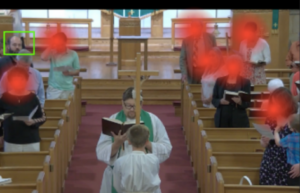
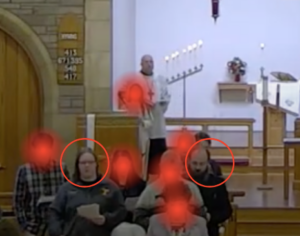
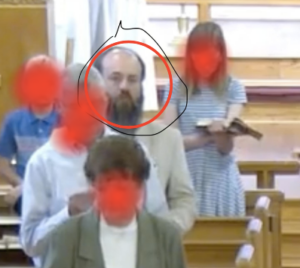

Mahler has successfully embedded himself in the life of the church. At around 00:20:23 of Episode 2 of Tischreden, Mahler alludes to purchasing a “Moravian Star” (a large traditional Advent ornament) for First Lutheran Knoxville, as well as voting in a congregational meeting. The fact that the LCMS denominational leadership permits a neo-nazi to participate in organizational decisions should be of enormous concern.
First Lutheran Knoxville is pastored by Edward Maanum. On Twitter, the co-host of Corey’s Stone Choir podcast, who goes by Woe (@treblewoe, formerly known as @eschatologuy and @meldendcastles before that), indicated that a group of pastors had written Maanum to complain about Mahler’s explicitly white nationalist and antisemitic tweets. At around 01:55:21 of Episode 3 of the Tischreden podcast, Mahler expresses admiration for Maanum and indicates that Maanum has stood by him despite criticism. He jokes that he owes Maanum a beer for his solidarity. We can assume that Maanum is either indifferent to Mahler’s views or espouses them himself. At around 1:51:00 of Episode 2 of Tischreden, Mahler also alludes to meeting with Pastor Emeritus Rev. John Schulz and his wife. At around 00:11:02 of Episode 3 of Tischreden, Mahler speaks highly of Schulz, saying that he hopes to feature Schulz on the podcast. This indicates that Schulz may also be sympathetic to Mahler’s views as well.
Mahler doesn’t just attend church in Knoxville; he is expanding his online efforts and recruiting on a local level. As mentioned above, he increased his Twitter presence in mid-to-late 2022, and also started two podcasts, Stone Choir (with sidekick Woe) and Tischreden (with Knoxville native Zak McGaha). These podcasts serve to supplement his preexisting Confident Faith podcast, a more explicitly devotional series for which he also created a website. At the same time, Mahler continues to write on the eponymous blog he’s maintained for over a decade.
2021-present day: Mahler’s support for “Super Lutheran,” aka Lutheran Pastor Blake Kilbourne
As Mahler was planning his move to Knoxville in 2021, he continued to stump for Charlottesville’s architects, supporting a UTR-linked figure within conservative Lutheranism. Blake Kilbourne (aka “SuperLutheran”) is a pastor and neo-Nazi podcaster who had a significant position in Vanguard America, the precursor to Patriot Front. In the Anonymous Comrades Collective’s Jan. 2022 doxx of Kilbourne, they note that Vanguard America wasn’t just present at UTR 2017; they also “instigated a large part of the violence” that transpired there. SuperLutheran / Kilbourne is believed to have significantly shaped the religious dimension of Vanguard America’s propaganda. At the time of the doxx, Kilbourne was pastoring Our Savior Lutheran Church in Dickinson, ND, part of the Association of Free Lutheran Congregations (AFLC). Before this doxx, however, evidence suggests that Mahler not only collaborated with Kilbourne, but also that key figures in conservative Lutheran circles knew, and concealed, Kilbourne’s identity. Unpacking this pre-doxx situation requires explaining the complex interrelationships amongst conservative Lutheran denominations.
During the fallout from Kilbourne’s doxx, a local North Dakota paper reported that Kilbourne had previously pastored at a Washington-based church belonging to the American Association of Lutheran Churches, a Lutheran organization closely linked to (“in fellowship with”) LCMS. (The AALC is not to be mistaken for the AFLC—Lutherans have a particularly convoluted history of denominational splintering.) According to the paper, AALC church Emmanuel Lutheran had employed Kilbourne as an intern, and considered making him head pastor in the spring of 2021. However, Kilbourne was denied the position after appearing before a May 2021 AALC “determination hearing” in Iowa.
The AALC maintains that this hearing merely involved a discussion of whether Kilbourne was a “viable candidate,” remaining tight-lipped about whether Kilbourne’s extremism was factored into the decision. The former pastor of Emmanuel, Tim Cartwright, denies that Kilbourne’s fascist activities had anything to do with his dismissal. In a July 12, 2021 reply on the right wing media site Poast, though, Kilbourne said that he was, in fact, “fired [from the AALC church] for being Super Lutheran”—i.e., for being a Nazi.

This background is relevant because, in episode 3 of the Tischreden podcast, Mahler indicated that he attended the 2021 AALC “determination hearing.” Supporting Super Lutheran’s version of events, Mahler’s comments differ markedly from Cartwright’s and AALC representatives’ official statements. His account comes in the middle of a zealous defense of Kilbourne, beginning around 00:04:00 of the episode. He accuses pastor Jordan B. Cooper, an AALC figure, occasional LCMS ally, and frequent critic of Mahler’s, of “lies.” Mahler starts by claiming that Cooper “brought charges” against Kilbourne and even aided in his doxxing. Mahler seems to mean 1) that Cooper called for disciplining Kilbourne, and 2) that the hearing involved discussion of his “charges.”
Mahler didn’t specify whether he thinks Cooper “brought charges against” Kilbourne in the AALC (pre-doxx) or the AFLC (post doxx). However, it seems reasonable to assume that Cooper acted with respect to the AALC: not only does Cooper sit on the AALC’s executive committee, but AALC is “in fellowship” with LCMS while AFLC isn’t. (Confused yet?) If Mahler’s account is accurate, this would mean that Kilbourne’s identity was known to Cooper, and perhaps other AALC/LCMS senior leadership, before the 2022 doxx—but that no one chose to publicize this information. It would also mean that, contrary to Cartwright’s account, the determination hearing actually did involve discussion of Kilbourne’s far-right profile. Corroborating this theory, Mahler then described advocating for Kilbourne at an “AALC” hearing, complaining that those presiding over the hearing tried to ban him from its proceedings. In response, Mahler says he refused to accept this because “I spent time traveling to get here.” Depending on where he was living at the time, Mahler traveled from either California or from Tennessee to attend the Iowa hearing.
Mahler boasted that he was able to convince “all but one” panelist at the hearing of his perspective, saying that even the holdout was “50/50.” However, Kilbourne was ultimately denied a pastorate because, as Mahler lamented, “the hearing panel and the body making the decision are not the same.” In short, Mahler seems to have tried to help Kilbourne secure a pastorate in the AALC. His account of the hearing, if true, is revealing. It means that Mahler already knew that Kilbourne was “Super Lutheran” before the doxx, perhaps because they moved in the same circles; it means that Mahler was close enough to Kilbourne to take time to travel to Iowa on his behalf; it means that Cartwright and AALC representatives were not forthcoming about the nature of the 2021 hearing; and, based on the (apparent) openness of hearing panel members to his arguments, it means that Mahler was able to tap into a latent sympathy for Christofascism within the AALC.
Mahler’s admiration for Kilbourne stems from his intimate familiarity with Kilbourne’s success. After describing the hearing on Tischreden Episode 3, Mahler said, “I’ve seen all of the emails, the messages. I know roughly how many people have been brought to the faith because of him.” It is unclear if this refers to Kilbourne’s evangelism for Christianity or for the white supremacist movement. However, given Mahler’s racist theology, it seems likely that he is conflating both. For many in these circles, evangelism is also a recruiting tactic for white nationalist organizing. Kilbourne’s success at the former would suggest success at the latter.
Kilbourne seems to have reciprocated Mahler’s admiration. On Poast, a user named SuperLutheran recently boasted that Corey Mahler was his “homie.” According to the Anonymous Comrade Collective’s report on Kilbourne, this would be the same “Super Lutheran” as Blake Kilbourne. We can assume that the two maintain a friendship, if not a collaborative relationship. A user named Super Lutheran is also an active member of Corey’s Telegram channel.

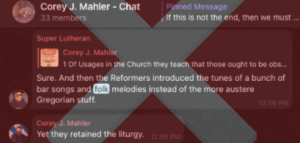
Thankfully, in May 2022, Kilbourne was removed from fellowship with the AFLC, and replaced with pastor Scott Erickson at Our Savior’s Lutheran. Our Savior’s site and Facebook page have wiped all evidence of Kilbourne’s time pastoring the church. Declining to comment on the circumstances of Kilbourne’s removal, the AFLC newsletter merely states, “the ministry [Kilbourne] is involved in would be better operated from a context other than congregational ministry.” To say the least, Kilbourne’s “ministry” of indoctrinating Nazis should be kept far, far away from Lutheran congregations—or any other organization, for that matter.
Tischreden podcast and association with Zak McGaha, aka Protestant Folk Peasant
Corey’s determination to indoctrinate younger Lutherans can be seen in the mentorship of his Tischreden podcast co-host, 24-year-old Zak McGaha, who goes by the pseudonym “Protestant Folk Peasant” online. In calling himself a “folk peasant,” of course, Zak echoes the “Volkish” ideology that Mahler has and continues to push.

A former horror writer, McGaha has declared that his conversion to Lutheranism required abandoning that genre for what he calls “cozy Christian fiction.” McGaha amplified Mahler’s views with his Protestant Folk Peasant (now-deleted) Facebook and Twitter pages, echoing the antisemitic, racist, and transphobic theology Cory discusses on Tischreden. In a tactic to lure conservative Lutherans further right, McGaha also regularly posts to Telegram channels with less overt white supremacist views, creating a pipeline by which Lutherans move from snarky memes to horrendous Lutefash ideology. Elsewhere, he uses his place in the writerly community to create space for far-right extremism. In a January 23, 2023 episode of a podcast titled “Facebook Has AIDS,” McGaha joined horror writer Tom Monteleone in making transphobic and racist comments. This episode led to Monteleone being ousted from the Horror Writers Association.
It’s unclear if McGaha was specifically invited by Mahler, but the young fascist-in-training is a fellow congregant at First Lutheran Knoxville. He seems to have become especially interested in the LCMS in mid to late 2022, “liking” almost every livestream post on the church’s page from then onward. Presently, McGaha regularly appears seated next to Corey Mahler on the livestreams of First Lutheran Knoxville. It’s reasonable to infer that Zak is the first of many local sycophants that Mahler hopes to gather around himself.

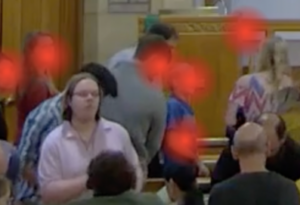
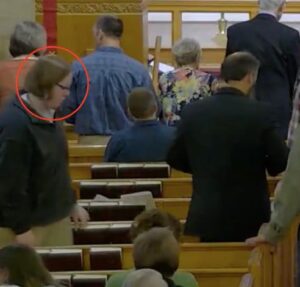
Mahler’s influence on Zak is evident even in the phrases that the latter has adopted. On Twitter, Mahler likes to respond to detractors and ideological opponents with some variation of the phrase, “Look, a demon.”

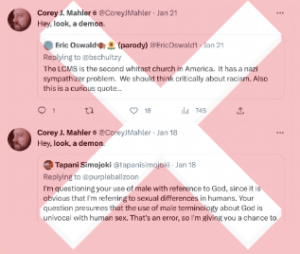
On Facebook, Zak can’t help but express himself in similar terms during a testy exchange with someone calling out his transphobia and misogyny.

Similarly, Mahler enjoins his followers to “go to church,” using a particular meme. 
Zak has borrowed both the meme and the exhortation.


On Tischreden, Mahler seems to play up an aura of being an experienced man-about-town, possibly a tactic for impressing younger men like Zak. As a result, he takes a rather different tone from that of his other podcasts. For example, on Stone Choir’s Jan. 25 episode, Mahler talks soberly about becoming Lutheran in college. Speaking of his college years on Tischreden, however, Mahler talks of being immersed in “dens of iniquity,” alludes to promiscuity with cheerleaders, and warns against “sending daughters to college.” He teases, “Some of us know what they’re doing while they’re there” (approx. 01:40:00 onward of Episode 1). In various episodes Zak and Corey comment with relish about women’s physical appearance.
Zak and Corey record their podcast episodes at a local brewery after church. Based on their descriptions of the brewery as Germanic in emphasis, as well as cross-checking Zak’s photos with images from local breweries, we can confirm that they record their podcasts at Schulz Brau Brewing Company located, in their own words, “just down the street” from their church. They have even joked about bringing a whole crew from their church to take over the balcony (around 01:54:43 of Episode 3). While they don’t sound entirely serious, the comment is a disturbing reminder of how neo-Nazis try to expand their presence by claiming local bars as their own—starting with innocuous visits from a handful of people.

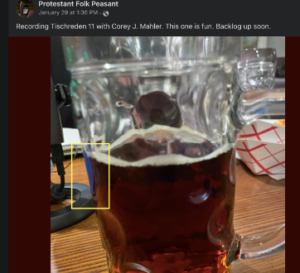

Schulz Brau is owned by Nico Schulz. Along with Fanatic Brewing Company, another local vendor, it participates in Germanfest, a local festival dedicated to German food and culture hosted by First Lutheran Knoxville each year. The annual August festival raises money for First Lutheran’s school.

At the brewery, Zak’s and Corey’s podcast recordings involve antisemitic, transphobic, homophobic, and racist content. They allude to recording for hours on end, with mics and laptops set up at their table. They talk not infrequently about approaching women at the bar. Their presence obviously creates an unsafe space for other patrons of Schulz Brau Brewery.
Mahler’s growing network and purposes
It is apparent that the LCMS is a safe haven for Lutefash like Mahler. With Discord archives featuring many LCMS members tied to far-right organizing, and Mahler’s crew singing the denomination’s praises, facts on the ground clearly contradict official denominational statements about inclusion, racism, and justice. The LCMS denominational website states, for example: “The Lutheran Church—Missouri Synod condemns racism and asks its members to combat it.” A 2019 Synodal resolution affirmed the “Common Humanity of All People and Ethnicities,” stating, “Christian response to racism is centered in the Gospel of Jesus Christ and is shaped by clear Biblical principles.”
In contrast, Mahler and his growing ilk tell a very different story. For them, the LCMS’s “based” reputation in the Discord leaks represents an ideal that they hope to foster within the denomination. Conversely, to Lutefash, a statement like the official LCMS response to George Floyd’s murder amounts to “high-handed, unrepentant, knowing sin.” In the below screenshot, Mahler goes even further, insisting that LCMS theology categorically affirms the anti-Black “curse of Ham” doctrine.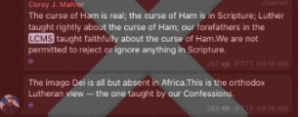
In short, Mahler and his supporters see their purpose as pulling LCMS back from the brink of “wokeness” and returning it to what they see as its historic essence, a denial of “common humanity” and open support for white supremacy. For them, even mild (and non-binding) statements of anti-racism amount to a betrayal of Lutheran tradition. As the recent controversy around the Large Catechism shows, Mahler and his supporters are determined to make far-right policies the official and explicit agenda of the LCMS.
Mahler’s success in advancing this goal, in collaboration with right-wingers in churches around the country, is exemplified by his work with Oklahoma-based Ryan Turnipseed. Turnipseed, which appears to be his real name, is also a Lutefash influencer with a significant following. Running a Youtube channel with 3.9k subscribers as well as a few Telegram Channels, he traffics in similar traditionalist and anti-semitic content. Turnipseed’s channels regularly share Mahler’s content, and Woe is a member of Turnipseed’s Telegram. Turnipseed also hosted Mahler and Woe on his YouTube channel in January of 2023.
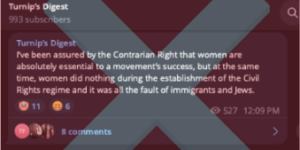
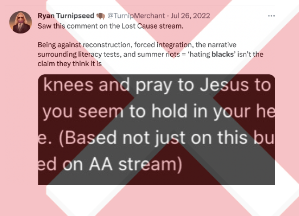
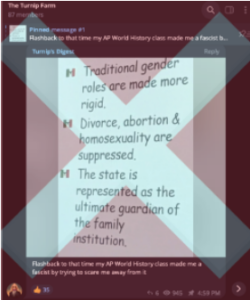

(Image fully obscured due to intense anti-semitic depiction)
Turnipseed uses his real name and his avatar looks like him. This allowed us to identify him as attending First Lutheran in Ponca City, OK. He appears in the stream of their service on May 7, 2022 and is featured in their bulletin.

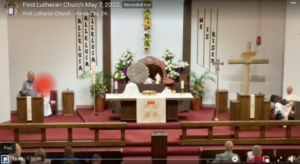
The pastor of First Lutheran, Ponca City is Joseph Highley. It is unclear if he is aware of Turnipseed’s fascist beliefs. First Lutheran Ponca City’s associated school does include a non-discrimination policy on their website, but given Turnipseed’s relatively high visibility, it seems unlikely that his association with neo-nazis would have escaped Highley’s notice. At the very least, Highley’s possible ignorance of Turnipseed’s activities demonstrates the ease with which Mahler and his ilk have slipped into positions of influence in LCMS churches, under the oblivious or approving watch of pastoral leaders. It’s clear that Turnipseed isn’t a casual presence at First Lutheran Ponca City, either. In a recent tweet, he alluded to “everything he’s been doing” on behalf of his parish, as well as his relationship with his pastor.

As their reach increases, we can expect to see fascists continue to flock to this denomination. When asked in Telegram, “What is the best Luther synod?” Mahler’s response is “LCMS.”

In the same way that Mahler and the Lutefash want to attract fascists to the LCMS, they also seek to pull the LCMS towards fascism. In the wake of the Catechism controversy, Mahler’s disciple McGaha summed up the Lutefash “victory” as a broader refusal to just “play defense” over traditional values. His generation, he warned, is ready to go on the offensive.
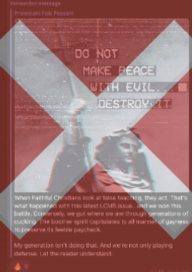
One member of Turnipseed’s community, Luthemplaer (himself a sort of Catholic/Lutheran hybrid found in Lutefash online spaces. In an interview from January 2023, he states he is a Lutheran but in other places claims to be Catholic. While his specific denominational allegiances may be fluid, his membership in the larger Christofascist community is not. Luthemplaer participates with LCMS figures and other Lutefash. Our larger concern is with his fascism and white supremacy, not only possible LCMS membership), even laid out the ultimate aim of the fascist faction: “Given the small size of the LCMS to start, it may be worth using it as a testbed as to how a traditionalist coalition might retake an institution.” While it seems the LCMS is being infiltrated to expand its support for fascist traditionalism and white supremacist Christianity.

Luthemplaer’s prolific output illustrates the ambitiousness of Lutefash’s “testbed” ecosystem. He runs his own channel called The Restoration Bureau (with over 5k subscribers) and claims to be the creator of the infamous nazi YE image. Through such efforts, he and fellow fash seek not just more power within the denomination, but a platform in fascist politics more broadly.

Mahler, McGaha, Woe, Turnipseed, and Luthemplaer are only the most prominent figureheads of this faction. Future posts will spotlight the details of LCMS fascist strategy, including further information on key LCMS-identified members of the Discord chat leaks. However, even as we expose these open Lutefash, we must also expose the complicity and silence of the denomination and its associated organizations. As we’ve seen, conservative Lutherans have repeatedly refused to acknowledge fascist activity, as in the case of the AFLC’s dismissal of “Super Lutheran” Blake Kilbourne, not to mention the AALC’s denial of knowledge about Kilbourne’s nazi views. Even worse, they show weakness for pro-fascist arguments (e.g., the panelists Mahler apparently swayed to Kilbourne’s side) or just outright stand with those fascists in the face of criticism (e.g., Mahler’s current pastor, Edward Maanum). Even someone like Jordan B. Cooper, a frequent critic of Mahler’s, seems to have preferred a behind-the-scenes discussion of Kilbourne, instead of publicizing his threat to vulnerable minorities.
Sadly, these examples of complicity and silence are all too predictable in a denomination where even public opponents of Mahler think that progressives are worse than the far-right, as in the first screenshot below. And as the second screenshot makes clear, this downplaying of fascism’s severity stems from the fact that, at the end of the day, many of these pastors agree with racist ideology—they’re just more polite about it.
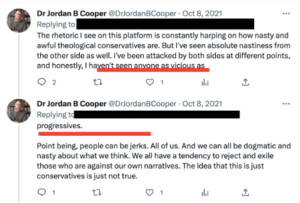
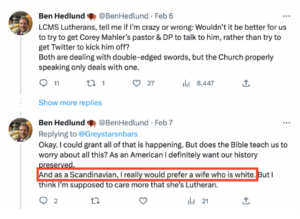
How To Take Action
To borrow a phrase from Martin Luther himself, the Lutefash want to raise a “mighty fortress” of neo-nazi hatred within the LCMS. Whether they succeed depends on how willing the rest of us are to dismantle it.
Folks looking for action items can contact the LCMS—and First Lutheran Knoxville in particular—and demand they denounce Mahler, as well as excommunicate him from their community. They can also contact Schulz Brau Brewing House and Fanatic Brewing and ask them to refuse any further participation in First Lutheran Knoxville’s Germanfest. In particular, Schulz Brau must also bar Mahler and McGaha from the premises and make the venue a safe space once more. Moreover, folks can also contact Chapman’s Fowler School of Law to demand a statement disavowing one of its most openly fascist alumni.
Finally, those concerned can also demand disciplinary action, up to and including a revocation of Mahler’s license, from the State Bar Associations of California and Tennessee. In particular, they can point out that Mahler’s actions violate the moral turpitude clause of the CA bar ethics code (Bus. & Prof. Code, § 6106), as well as the “unprofessional, dishonorable, or unethical conduct” clause of the TN bar ethics code (TN Code § 63-6-214 (2021)).
Without these actions, Mahler’s influence will grow in tandem with his faction’s plans. If churches truly believe the statement that “hate has no place here,” they must take specific action and remove it from the pews. At least in one church, we know where it sits—in the same pew, every week.
Update: We clarified Jordan Cooper and Luthemplaer’s denominational affiliation. Cooper is a member of AALC and while Luthemplaer participates with LCMS figures, has not been confirmed to be an official member of the LCMS denomination.